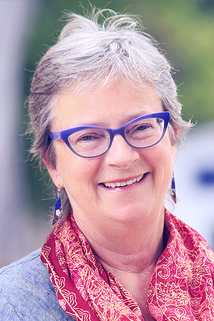How I Got Hired: Staff Translator at the French Embassy and Freelance Conference Interpreter
| by Nina Fink MATI ’12
Translation and Interpretation alum Nina Fink shares how she landed a career as a freelance translator and interpreter.
Professor Emerita

Jacolyn Harmer, born and educated in the UK, earned her BA in French/German at the University of Bradford before training as a conference interpreter at the European Communities (now European Union) in Brussels where she began her career, initially as a staff interpreter and then as a freelancer for international institutions and the private market.
Professor Harmer joined the Monterey Institute of International Studies’ Graduate School of Translation & Interpretation faculty as a full-time translation and interpretation professor in 1985, combining teaching with her freelance professional practice. Her clients have ranged from heads of state and government to medical missions in the global South.
A long-standing member of the International Association of Conference Interpreters (AIIC), Professor Harmer served for several years on the AIIC Training Committee. She earned her Diplôme d’Études Approfondies (Master of Advanced Studies / MAS) in interpreter training from the University of Geneva School of Translation and Interpretation in 2003 and joined the MAS teaching team. She has since designed and contributed to interpreter trainer programs worldwide. Professor Harmer has received several awards for her teaching, including the Institute’s Eliason Award for Excellence in Teaching in 2007. Her landmark translation of Pédagogie Raisonnée de l’Interprétation (Seleskovitch & Lederer) was published in 1996.
TIGR 8525
Intrm Intrp-Consc into EnglishCourse Description
Intermediate Interpretation – Consecutive and Simultaneous
Builds on the practical and theoretical foundation laid in Introduction to Interpretation. Consists of both language-specific and joint sessions with other language programs.
In consecutive, students learn to identify the implicit structural organization of an extemporaneous speech by presenting and interpreting speeches of this type. Reinforces ability to perceive essential meaning and further develops note-taking techniques. Emphasizes clarity of expression, correct style and grammar, proper diction, and polished presentation. Students also expand their active vocabulary to include the terms and idioms that frequently occur in extemporaneous speeches. At the end of the course, students are able to interpret passages that are delivered extemporaneously, are of moderate difficulty, and are derived from professional settings. These passages vary from one to several paragraphs in length depending upon language combination, direction, and source content.
In simultaneous, students are introduced to basic strategies of interpreting in this mode in the booth. Begins with a general introduction and follows up with a series of preparatory exercises helping students develop the concentration necessary for listening and speaking at the same time, mastering voice management, and acquiring smooth delivery techniques. Students learn to analyze discourse for meaning while rendering a coherent version in the TL with correct grammar, diction and style. At the end of the course, students are able to interpret passages that are between eight and ten minutes in length.
Content on a wide range of topics and current events is interpreted, with some emphasis placed on business and economics. Course assignments include readings and research on class topics, presentations, practice, graded exercises, and peer and self-assessment. The frequency, nature, and structure of course assignments and examinations are at the discretion of the instructor(s) of record.
Course prerequisites: Introduction to Interpretation or the equivalent
Terms Taught
Professor Harmer’s top priority in her teaching is for students to acquire the kind of adaptive expertise which will enable them to be professionally successful in a dynamic translation and interpretation marketplace. Believing in the power of intentional learning, she steers students toward systematic and solid mastery of their target skills. She firmly believes that a learning experience which is both challenging and satisfying will lead to the best possible outcome for students and faculty alike. Motivated by her own positive experiences in interdisciplinary collaboration, Professor Harmer helped pioneer the popular MIIS signature Interpretation Practicum and Monterey Model courses.
Professor Harmer has been teaching at the Institute since 1985.
| by Nina Fink MATI ’12
Translation and Interpretation alum Nina Fink shares how she landed a career as a freelance translator and interpreter.